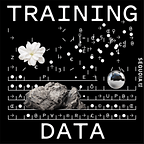Post methodology: Claude 4.0 via custom Dust assistant @TDep-SubstackPost with the system prompt: Please read the text of the podcast transcript in the prompt and write a short post that summarizes the main points and incorporates any recent news articles, substack posts or X posts that provide helpful context for the interview. Please make the post as concise as possible and avoid academic language or footnotes. please put any linked articles or tweets inline in the text. Please refer to Podcast guests by their first names after the initial mention. Light editing and reformatting for the Substack editor.The way we write software is about to change dramatically. In this episode, Alexander Embiricos and Hanson Wang from OpenAI's Codex team shared their vision for a world where most code isn't written by humans sitting at keyboards, but by AI agents working independently in the cloud.
This isn't your 2021 Codex. While the original model powered GitHub Copilot's autocomplete features, the new Codex is a fully autonomous coding agent that takes on entire tasks and returns complete pull requests. Think of it less like a smart autocomplete and more like hiring a junior developer who works in their own environment.
From Pairing to Delegating
The biggest shift Alexander and Hanson describe is moving from "pairing" with AI (where you work side-by-side in your IDE) to "delegating" tasks to agents working on their own computers. This requires what they call an "abundance mindset"—running multiple tasks in parallel and seeing what works, rather than carefully crafting each request.
The results at OpenAI are striking: top internal users are generating 10+ pull requests per day. As Hanson put it, "It's just really such a multiplicative factor." One memorable example: at 1 AM before launch, they were stuck on a bug with a Lottie animation. After running the task through Codex four times, one attempt fixed the issue that had stumped engineers for hours.
Bonus Essay: How OpenAI Codex Is Reshaping Software Development
The Professional Software Engineer Problem
While existing models like o3 excel at competitive programming contests, Codex has been specifically fine-tuned for the messy realities of professional software development. Alexander compared it to the difference between "a really precocious competitive programmer college grad" and someone with three years of job experience who knows how to write proper PR descriptions, follow code style guidelines, and write meaningful tests.
This training required creating realistic development environments—complete with the kind of legacy code and missing unit tests that characterize real-world projects. As Hanson noted with a laugh, when examining one startup's codebase: "So, like, where are the unit tests?"
More Developers, Not Fewer
Counterintuitively, Alexander predicts the number of professional software developers will increase, not decrease. His reasoning: "The easier it is to write software, then the more software we can have." He points out that most apps on our phones are built by large teams for millions of users, with very few bespoke solutions for individual needs. As AI lowers the barrier to creating custom software, demand for developers will grow.
This aligns with broader industry trends discussed in recent analyses of the AI coding market, where tools like GitHub Copilot have already shown productivity gains without displacing developers.
The TikTok Future of Code Review?
Perhaps the most intriguing vision Alexander shared was a half-joking UI concept: imagine managing your AI agents through a TikTok-like interface. Agents would proactively suggest fixes and features as short videos, and you'd swipe right to approve, left to reject, or hold to provide feedback. It's a playful but thought-provoking glimpse of how code review might evolve when agents are generating the majority of changes.
What This Means for Developers
The immediate takeaway isn't that coding jobs are disappearing—it's that the nature of coding work is shifting toward higher-level planning, reviewing, and decision-making. As the tools become more powerful, developers who embrace the "abundance mindset" and learn to effectively delegate to AI agents will have significant advantages.
For teams preparing for this future, Alexander and Hanson recommend focusing on the fundamentals that help both humans and AI: good test coverage, clear documentation, and well-structured codebases. Even simple decisions like choosing distinctive project names (they used "WHAM" instead of generic terms like "code") can make a difference in how effectively agents navigate your codebase.
The age of the AI coding teammate is here. The question isn't whether it's coming—it's how quickly we can adapt to working alongside our new digital colleagues.
Hosted by Sonya Huang and Lauren Reeder
Mentioned in this episode:
The Culture: Sci-Fi series by Iain Banks portraying an optimistic view of AI
The Bitter Lesson: Influential paper by Rich Sutton on the importance of scale as a strategic unlock for AI.
PAWS-X: Dataset for improving natural language understanding in models. PAWS (Paraphrase Adversaries from Word Scrambling) is in English, and PAWS-X is in French, Spanish, German, Chinese, Japanese, and Korean.
Linear: Project management and issue tracking software development teams that is one of Alexander’s favorite AI apps—because it doesn’t say it’s using AI.










